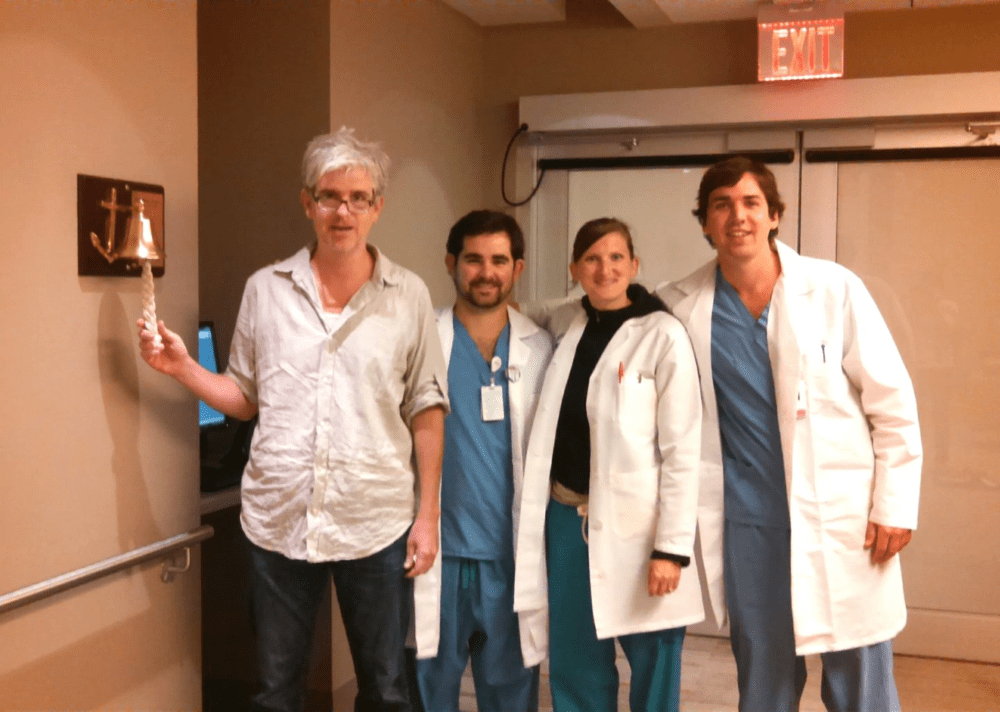Advertisement
In 'Mr. 80 Percent,' An Intimate Portrayal Of Surviving Prostate Cancer
Resume
The story of a Boston Globe reporter who decided to document his life with prostate cancer via a new — and very personal — podcast.
Guests
Mark Shanahan, entertainment reporter at the Boston Globe. Host of the podcast "Mr. 80 Percent." (@MarkAShanahan)
Dr. Mark Pomerantz, oncologist at The Dana-Farber Cancer Institute.
Tom Farrington, president and founder of The Prostate Health Education Network.
Interview Highlights
On the prevalence of this “absurdly common” disease
Mark Shanahan: Doctors like to say that most men will either die with prostate cancer or from it. 1 in 9 men are diagnosed in their lifetime with prostate cancer, but many more men have it and don't know it. Prostate cancer is extremely treatable, we should say, an extremely treatable disease, and very slow growing. I don't want to say — I was not psyched to get prostate cancer, but, you know, there's been just an enormous progress made in the research and treatment of prostate cancer. But that's what makes the whole thing so ironic, is that it is so common.
"1 in 9 men are diagnosed in their lifetime with prostate cancer, but many more men have it and don't know it."
Mark Shanahan, host of 'Mr. 80 Percent'
On why men are hesitant to talk openly about prostate cancer
Mark Shanahan: “My father 15 years ago was treated for prostate cancer. We never spoke about it. We didn't talk about the treatment. We didn't talk about the effects that it had on his body…
“What you discover is that the reason men don't talk about it is because prostate cancer treatment can have a catastrophic effect on your continence and your sexual function. It just so happened that I was 20 years younger, the average age at diagnosis of prostate cancer is 66; I was 47, treated at 48. And, you know, my wife and I, you know, we have a healthy sex life. In fact, at that time, we had sort of, well, we were having sex again. And Michelle was read she was reading all these romance novels and it was totally great. And so to be diagnosed with something A) that we didn't know anything about, and then B) a disease that can really ruin you sexually, it was tough.”
On the impact of the disease on a patient’s family
Mark Shanahan: “When you're when you're treating a prostate cancer patient, you're really treating the couple. And so Michelle had a heavy lift. Michelle, my wife. And she was extraordinary. So it's a learning process for she and I. But then in terms of our children, well, Beckett, we would like to get him into the podcast, but my son is a 15-year-old boy now. And, you know, we wanted him to say, well, we were gonna have to talk about our penises. And that was it. He just wasn't willing to go there. So, again... we say in the podcast that you get the cancer, but everybody's life changes. And I don't think that unless you go through something like this, you can really appreciate what that means. But, you know, I certainly do.”
On the advances in treating the disease over the past few decades
Mark Shanahan: “I had a Gleason score, which is a score after they give you your biopsy and take a look at what's happening. They grade basically the severity of the intensity of your cancer. And mine was 7 out of 10, and that's considered to be intermediate. I guess, you know, the options for me were to watch it, to have surgery or to radiate my prostate. And in the end — there have been enormous advances in the treatment of prostate cancer over just, you know, 30 years. If I had gotten prostate cancer 50 years ago, it would be rough, rough, rough. And not just for me. Every man who had a prostatectomy, which is the surgical procedure to remove your prostate, before 1982, left the hospital impotent. Every single guy, which is just incredible to me, because 1982 is not that long ago.”
On going on hormone therapy when surgery wasn’t enough
Mark Shanahan: “It removes the testosterone from your body. And the reason that we do that is because it's the thing that feeds the cancer: Prostate cancer grows thanks to testosterone. So if you remove it from your body, the cells, the cancer cells, in some cases, they die. And then when they're at their weakest, you blast them with radiation. The problem is that when you take testosterone out of a man's body, it is, as you say, excruciating. I became a different person. I had, you know, the euphemism is mood swings. I didn't have mood swings; I had tantrums. And I will say that I was on the phone this morning with a guy who listened to the first three episodes of the podcast, and he said he had never talked to anybody about his course of Lupron, and he was arrested. He actually got arrested in a parking garage because he got completely out of control. So it's scary. An, you know, now as I sit here, there's you know, there's surgery. If the prostate cancer should return. There is no surgery. There is no radiation. Those are no longer alternatives. And the prospect of more Lupron or any kind of hormone therapy is really terrifying to me.”
"The euphemism is mood swings. I didn't have mood swings; I had tantrums."
Mark Shanahan
On just how common prostate cancer is — and how that complicates screenings
Dr. Mark Pomerantz: “We know this from the old days when we used to routinely do autopsies on people who died in the hospital of natural causes. And we know that when we look at prostates in American men who live long enough, most of them are harboring a prostate cancer. And this is what makes this disease so tricky and makes the idea of screening for the disease so tricky, because we know if we go around looking for it, we're going to find it. But we also know that as we walk down the street, we don't see men dropping dead left and right of prostate cancer, even though they have it, because most men die with it, not of it. And we have to be very careful; if we are actively looking for it, we know that a substantial proportion of the time we're going to find it unnecessarily. On the other hand, prostate cancer is the second leading cause of cancer death among men in the United States. We really need to find those cases out there that are curable and need to be cured.”
On what the prostate actually does
Dr. Mark Pomerantz: “It does provide some of the critical fluids that go into the semen that help the sperm make it to its destination, helps the sperm survive. And that seems to be its most important function. It's pretty big in us, compared to other mammals. And why that is, is interesting. We research men, and homosapien men certainly compete with one another for mates. So we do want the best, most high-quality semen possible, and that may account for some of the increase in size of the prostate. And it may be our big prostates that put us at such high risk for prostate cancer as we age. Interestingly, the only other species that naturally gets prostate cancer at any appreciable rate are dogs, who share our lifestyle and diet. And so there certainly may be a component there contributing to our cancer risk. But other than those functions, there isn't an important role that we are aware of.”
On why Black men struggle with open dialogue about prostate cancer
Tom Farrington: “There is a lack of knowledge, and a reluctance to talk about it. And I think the two go hand-in-hand. Because if as a population that is at highest risk, the highest death rate, we want to talk about it and really, really sound the alarm within our communities, then I think more black men will know about it and be prepared with enough knowledge to kind of navigate treatment and living with the disease.”
"There is a lack of knowledge, and a reluctance to talk about it. And I think the two go hand-in-hand."
Tom Farrington, president and Founder, Prostate Health Education Network
On the prognosis for getting treatment
Dr. Mark Pomerantz: “When we diagnose the new prostate cancer, the first question we ask, and part of the initial surgery, is to turn to is to determine as best we can whether the disease is confined to the prostate or the disease has spread or metastasized beyond the prostate. If the disease is confined to the prostate, it is generally curable. Some prostate cancers, even when confined to the prostate, are more aggressive than others. But generally, when the disease is all corralled within the prostate gland, we can cure it with surgery and or radiation therapy. It's the radiation therapy can get a little bit more complicated, because as Mark describes so accurately and with great depth in his piece, in his podcast, radiation therapy is augmented by hormonal therapy. And those are the general tools that we have for curing prostate cancer that's confined to the prostate.”
From The Reading List
Boston Globe: "I knew getting prostate cancer at 48 would change me. I had no idea how much." — "It’s a Sunday afternoon in June 2012. I need a hot shower and a handful of Advil. I’d been drinking bourbon and dancing at a friend’s wedding until the wee hours, and I’m feeling ragged as I seesaw up to my front door."
Change Together: "Daddy’s Boys – a new play tackling prostate cancer disparity in African-American men" — "Thought provoking and emotive – a new play is offering up an entertaining way to break the silence surrounding black America’s prostate cancer crisis."
Today Show: "Prostate cancer warning signs: What doctors say you need to know" — "What are the symptoms for prostate cancer? Here’s the thing — you probably won’t notice any."
This program aired on September 25, 2020.

